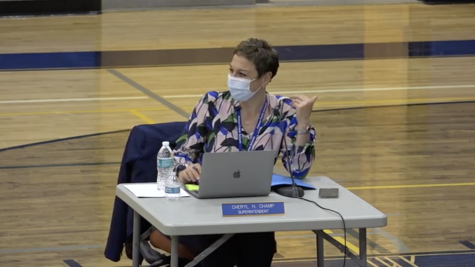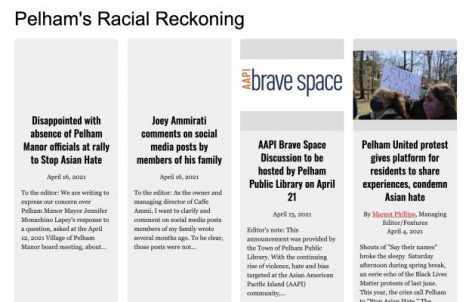Letter from NY detectives’ union deepened divide in community, made it harder for students to speak up
To the editor:
Regarding the recent controversy, I write to express my support for Pelham Superintendent Dr. Cheryl Champ’s decision to ban apparel involving political speech. As a student who has been in the Pelham school district for several years, I, like many others, was under the impression that this, along with refusing to verbally share political ideology, was an agreed upon rule among all faculty members and was surprised to hear of faculty wearing apparel that can be construed as political. Many adults in different occupations cannot wear apparel that contains political speech. It is imperative that we extend this policy to our faculty, who spend their days around children.
According to the district’s code of conduct, “All District teachers and support personnel are expected to… Maintain a climate of mutual respect and dignity for all students regardless of actual or perceived race, color, weight, national origin, ethnic group, religion, religious practice, disability, sexual orientation, gender/gender identity, or sex, with an understanding of
appropriate appearance, language and behavior in a school setting, which will strengthen students’ self-image and promote confidence to learn.” For some students who complained, they found that wearing the thin blue line flag violated the sense of mutual respect listed in this policy thus making them feel unsafe.
In order to understand why this ban took place, we must first understand what prompted students to feel threatened by the flag. I recognize that the symbol is not meant to be seen as offensive, but it has evolved to be held in a negative context associated with the Blue Lives Matter movement. For many students of color, the thin blue line flag is a symbol that undermines the racist experiences they have had with police officers. Although for white students it is not a result of directly experiencing systemic racism, the symbol makes many of them uncomfortable as well.
I appreciate Pelham Manor Detective Paul Roberts’ acknowledgement of the unfavorable experiences that are not representative of Pelham Manor’s police force and his willingness to work to fix many students’ mistrust of the police because of said experiences. Unfortunately, Roberts’ attitude has not been demonstrated by many adults who have made comments on news platforms regarding this issue. The letter written to Champ by the Detectives’ Endowment Association is believed to be written out of passion that the ban on the sweatshirts was an apparent insult to the late Detective George Caccavale’s legacy. I acknowledge that I am in no place to decide whether Caccavale’s legacy was tarnished. The issue was with the flag’s symbolism, not with the memory of Caccavale.
However, in its letter, the Detectives’ Endowment Association insulted the intelligence of the students who complained and insinuated that their feelings toward the flag were invalid. These comments made by the detectives’ union, regardless of intent, only served to deepen the divide between the community. Instead, it has further exacerbated the situation, making it harder for students to speak up about issues that are bothering them. I say this to bring awareness to the consequences the letter’s rhetoric has on students. I was afraid to write this letter in fear that adults, not other students, would personally attack me, instead of politely disagreeing with my opinions. But, this letter is necessary to shed light on a few students’ perspectives in the midst of comments from many concerned adults on what is primarily a student matter.
It is disappointing that students felt that they had to go to Champ regarding their safety in school, but this situation has shown how crucial it is for our community to ensure the emotional safety of our students and simultaneously try to unify our town. Sweeping this issue under the rug in order to “move on” further contributes to feelings of isolation many people of color in the Pelham community have felt for years.
For an overwhelming number of people, their mistrust of the police did not stem from recent movements advocating for racial equality. Following the nationwide protests and racial forums in June, an increasing number of people have felt more comfortable sharing their experiences around racism, especially in a learning environment. I ask that everyone listen to how students are feeling in our schools, rather than question whether Champ is working towards a political agenda. We all need to work together so we can try to understand the students who feel unsafe seeing the thin blue line flag.
Nadine Leesang
519 Sixth Avenue
In support:
Katie D’Angelo
Alyssa Purcea
Layla Paras
Shanya Edmond
Ella Burns
Ellie Scola
Kezia Ranger
Nya Haseley-Ayende
Marlen Singh
Jasmine Zaman
Ahmad Deribe
Audrey Snarr
Haley Wall
Laila R. Polito
Shayna Corpas






Jennifer O”Grady • Nov 21, 2020 at 8:06 pm
Excellent, eloquent letter. Thank you!
Karen Gardner • Nov 21, 2020 at 11:54 am
I commend Nadine and the other students for coming forward and sharing their thoughts and feelings. Given the climate in the community and threats that have been made, it took great courage. Bravo!
That such a clear and respectful letter was written attests to the fine education students are getting, thanks to the leadership of Superintendent Champ and the teachers who have taught Pelham students how to express themselves in a cogent, intelligent, and thoughtful manner.
Sadly, the initial commenter clearly missed the point–made clear in the letter–that the students went to the superintendent to report their discomfort and she responded to their concern, as is her responsibility in overseeing the climate of the schools–to ensure they are safe learning spaces for ALL children. Nadine wrote: “It is disappointing that students felt that they had to go to Champ regarding their safety in school…” That makes clear that Champ was not using the students in sending her notice to faculty; she was addressing the concerns presented to her by the students. To suggest otherwise dismisses the feelings of the students and seeks to silence their voices. As parents and adults concerned about the children of our community, we should seek to listen even when we may not agree. We can learn a lot from children, just as our attitudes and behavior teach them.
It can be difficult to remove our emotions from a situation, but where our children our concerned — ALL of our children in the community — we should seek to take a step back and gain perspective from what they are telling us. We can learn and grow along with them and make our community stronger and more unified. We should be grateful that our youth are finding their voices and using them to shed light on an important issue that concerns them. Let’s come together to make sure they learn how to resolve their differences in a humane and decent manner. It will be for the betterment of our society on the whole and for our small villages and town.
Tiffany Hebert • Nov 21, 2020 at 11:46 am
I support you all and thank you for your bravery in writing this. Even more so for your bravery in signing your names to this, unlike the still anonymous author of the initial misleading article that led to this uproar.
Claire Persanis • Nov 21, 2020 at 9:35 am
I am so proud of these students. It took a lot of guts, to stand up and publicly push against the tide of hatred and anger that has spread across town over the last few weeks. This mom also sees you and stands with you! Well done!!
Diana Zee Chandler • Nov 20, 2020 at 11:45 pm
Everybody who reads this should be extremely proud of you and all the students who added their signatures. Speaking out is very difficult yet essential. You have written a very clear and impactful statement with a degree of conviction and level-headedness many adults could not pull off. Bravo!
Andrea Reinke • Nov 20, 2020 at 9:26 pm
Nadine and supporters,
Your courage and thoughtfulness give me hope. Thank you!
Amy Lacoste • Nov 20, 2020 at 8:35 pm
Nadine, your eloquence and depth are mind-boggling – you are still in high school?! – unbelievable !!!
I am deeply impressed with both your talent and your bravery. On that same note, I am angered by the insinuation that your opinions were somehow manipulated or forced upon you. Oh, well. As they say – let the haters hate. Take it as a compliment to your rhetorical skill, and never let them dim your fire .
It must be difficult for some adults to come to terms with the fact that children/students are not possessions or extensions of our own egos. They are individuals, complete with their own fully-formed thoughts, opinions, hopes, and fears. They should never be patronized or belittled when coming forward with a problem or grappling with a sticky social issue. Many adults could learn from your example. I really hope they do.
In the meantime, I’m cheering for you and your peers. You truly give me hope for the future.
Best wishes and thanks to all of you ❤️.
Amy Lacoste
Layla Paras • Nov 20, 2020 at 8:30 pm
Adults should listen and value the STUDENTS OPINION. School itself is uncomfortable as is, don’t make it worse for those who want to thrive in school. If you are not in support for Dr. Champ’s decision then you are part of the problem and you want to make students feel powerless. If you want to help the students actually feel like they have a voice THAN LISTEN and understand. Aren’t adults suppose to do what they can to make kids feel safe? how is this a radical idea?
Chris D’Angelo • Nov 20, 2020 at 8:01 pm
What a wonderful letter! Probably the best communication on this issue that has been written to date. It’s the kids, the students, who count. Let’s keep that top of mind.
Mayuri Gonzalez • Nov 20, 2020 at 7:51 pm
Thank you for your grounded and eloquent response and bringing us back to the core of the issue: Ensuring that ALL students on our schools feel safe, welcomed and respected.
It saddens me to see another adult in our town dismissing our children yet again, even here as they powerfully and bravely speak to how this experience is impacting them and their peers. They are so much more than pawns in a chess game. They are youth with voices they are exercising and to imply anything less is shameful. What will it take to validate and empower our young people rather than prioritize our own political views? They are watching us… all of us as a community.
To craft a public statement in this way is no small task and is incredibly brave. You rock and this mother sees you and stands with you!! Bravo!!!
William Federice • Nov 20, 2020 at 6:54 pm
Dr Champ as the superintendent of schools it is totally inappropriate and unacceptable to use the students as a means to address a very controversial matter that was created in the Pelham community by you. As the senior administrator who reports directly to the elected board of education the decisions you make to lead the educational program of Pelham should be made and enforced by YOU with the support of the board. Although the students who signed this document should be commended the action itself negatively and adversely reflects on your ability to lead the educational program of this community.